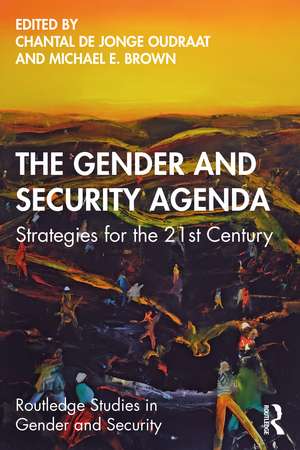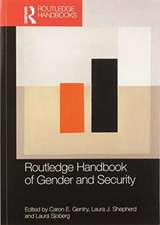The Gender and Security Agenda: Strategies for the 21st Century: Routledge Studies in Gender and Security
Editat de Chantal de Jonge Oudraat, Michael E. Brownen Limba Engleză Paperback – 8 iul 2020
This book examines the gender dimensions of a wide array of national and international security challenges.
The volume examines gender dynamics in ten issue areas in both the traditional and human security sub-fields: armed conflict; post-conflict; terrorism; military organizations; movement of people; development; environment; humanitarian emergencies; human rights; governance. The contributions show how gender affects security, and how security problems affect gender issues.
Each chapter also examines a common set of key factors across the issue areas: obstacles to progress; drivers of progress; and long-term strategies for progress in the 21st century. The volume develops key scholarship on the gender dimensions of security challenges and thereby provides a foundation for improved strategies and policy directions going forward. The lesson to be drawn from this study is clear: if scholars, policymakers and citizens care about these issues, then they need to think about both security and gender.
This will be of much interest to students of gender studies, security studies, human security and International Relations in general.
| Toate formatele și edițiile | Preț | Express |
|---|---|---|
| Paperback (1) | 362.26 lei 6-8 săpt. | |
| Taylor & Francis – 8 iul 2020 | 362.26 lei 6-8 săpt. | |
| Hardback (1) | 998.71 lei 6-8 săpt. | |
| Taylor & Francis – 8 iul 2020 | 998.71 lei 6-8 săpt. |
Din seria Routledge Studies in Gender and Security
-
 Preț: 363.00 lei
Preț: 363.00 lei -
 Preț: 363.00 lei
Preț: 363.00 lei -
 Preț: 389.38 lei
Preț: 389.38 lei -
 Preț: 389.38 lei
Preț: 389.38 lei -
 Preț: 383.04 lei
Preț: 383.04 lei -
 Preț: 311.41 lei
Preț: 311.41 lei - 18%
 Preț: 1006.11 lei
Preț: 1006.11 lei
Preț: 362.26 lei
Nou
69.34€ • 75.34$ • 58.28£
Carte tipărită la comandă
Livrare economică 21 aprilie-05 mai
Specificații
ISBN-10: 0367466503
Pagini: 292
Ilustrații: 8
Dimensiuni: 156 x 234 x 17 mm
Greutate: 0.59 kg
Ediția:1
Editura: Taylor & Francis
Colecția Routledge
Seria Routledge Studies in Gender and Security
Locul publicării:Oxford, United Kingdom
Public țintă
Postgraduate, Professional, and Undergraduate AdvancedCuprins
Notă biografică
Michael E. Brown is Professor at George Washington University’s Elliott School of International Affairs, USA.
Recenzii
'If you have been waiting for a pragmatic book on gender and security, this is it. Every fact-filled chapter is organized around the obstacles, drivers, and strategies for improving gender-based security, focusing on the "gender balance of power" as "the ultimate balance of power in human affairs."'-- Jack Snyder, Robert and Renée Belfer Professor of International Relations, Columbia University, USA
'Global security in all its dimensions can never be achieved until the security community takes gender and women’s equality seriously. The authors of this fine book tell us why. A must read for those in the security community – scholars, activists and policymakers alike who aspire to creating a more peaceful world.'-- J. Ann Tickner, Distinguished Scholar in Residence, American University, USA
'This edited volume features an all-star line up of some of the most articulate voices within the Women, Peace, and Security community today. One could not ask for a more approachable, one-stop shop of all things WPS. An extremely useful contribution that will surely have a long shelf life!'-- Valerie M. Hudson, Professor and George H.W. Bush Chair, Texas A&M University, USA
Descriere
This book examines the gender dimensions of a wide array of national and international security challenges.
The volume examines gender dynamics in ten issue areas in both the traditional and human security sub-fields: armed conflict; post-conflict; terrorism; military organizations; movement of people; development; environment; humanitarian emergencies; human rights; governance. The contributions show how gender affects security, and how security problems affect gender issues.
Each chapter also examines a common set of key factors across the issue areas: obstacles to progress; drivers of progress; and long-term strategies for progress in the 21st century. The volume develops key scholarship on the gender dimensions of security challenges and thereby provides a foundation for improved strategies and policy directions going forward. The lesson to be drawn from this study is clear: if scholars, policymakers and citizens care about these issues, then they need to think about both security and gender.
This will be of much interest to students of gender studies, security studies, human security and International Relations in general.

